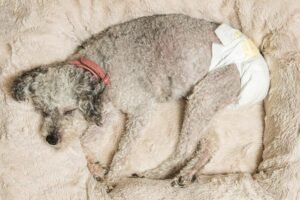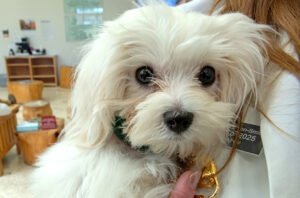There’s no question that puppies are adorable, but what’s going on inside their heads? Do they all learn the same way and at the same pace? Or does every puppy have their own strengths and timeline of cognitive milestones? Vanessa Woods, a research scientist at Duke University, and Dr. Brian Hare, a professor at Duke University, explored these questions in their new book Puppy Kindergarten. Their research followed 101 puppies to see just how puppy minds develop, and what they discovered might surprise you.
Why Raise 101 Puppies?
Woods and Dr. Hare enrolled 101 Labrador Retriever puppies in Duke Puppy Kindergarten to help discover why some dogs make great service dogs and others fail to graduate from their rigorous training programs. The goal was to develop a standardized set of tests to assess untrained puppies for which careers they would be best suited for, from drug detection to service dog to family pet. All of the puppies were bred by Canine Companions, one of the world’s largest service dog organizations.
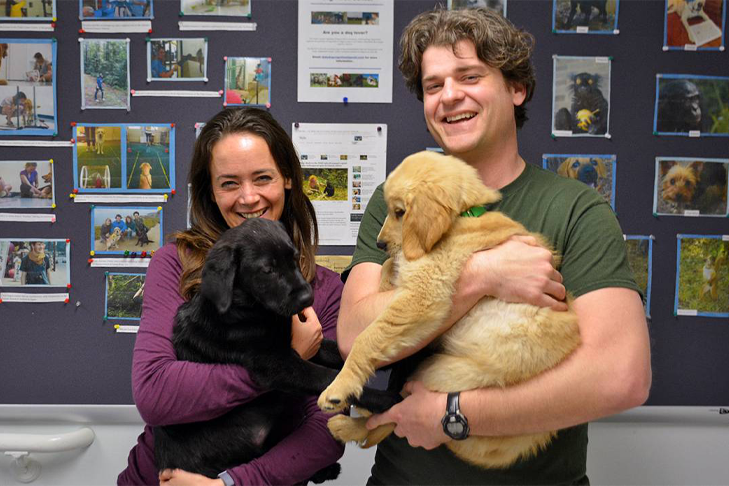
Fifty-two of the puppies were raised on the Duke University campus. Volunteers with Canine Companions raised the remaining dogs in their homes. All the puppies underwent a series of cognitive tests every two weeks between the ages of 8 and 20 weeks – their final period of rapid brain development. The tests were really games, such as fetch or find the hidden treat, designed to look at various cognitive abilities and how they develop.
How Do Puppies’ Brains Develop?
As Dr. Hare and Woods explain in Puppy Kindergarten, the traditional idea of intelligence is “something you have more or less of, like coffee in a cup.” If a dog can solve one kind of problem, they can likely solve all kinds of problems. But a different way of looking at intelligence is to see it as a selection of cognitive abilities that vary across individuals. This way of thinking is known as multiple intelligence theory. So, for example, just because a specific dog is good at navigation, that doesn’t mean they have a good memory, too.
In their earlier work with adult dogs, Dr. Hare and Woods found that the multiple intelligence theory fit dogs best. And the same was true with the puppies. According to Woods, their main discovery was when these intelligences, or cognitive abilities, appear in a puppy’s mind. “Like us, puppies are not born with all the bulbs in the box; these different cognitive abilities appear at different times. For example, their self-control develops slowly from 10 to 14 weeks old – so accidents in the house, tearing up everything in sight, and acting out every thought in their heads are pretty common before the four-month mark.”
What Are the Different Types of Dog Intelligence?
Puppy intelligence isn’t like a lightbulb that switches on at a certain age; instead, it’s a suite of lights that all turn on at different times. Some show up early and burn bright right away, whereas others come later and are slower to reach maximum brightness. The order in which the puppies acquired different abilities wasn’t what you might expect. For example, understanding basic human gestures like pointing arose before the puppies learned to understand the physical world or developed self-control. Woods says, “It was extraordinary to watch these 8-week-old puppies, who could barely walk across the room without falling asleep, who couldn’t navigate their way around a door, reading our communicative gestures better than any other species, including our closest living relatives, chimpanzees, and bonobos. Interestingly, just as it is the first intelligence to develop in puppies, it is also the first to develop in us.”
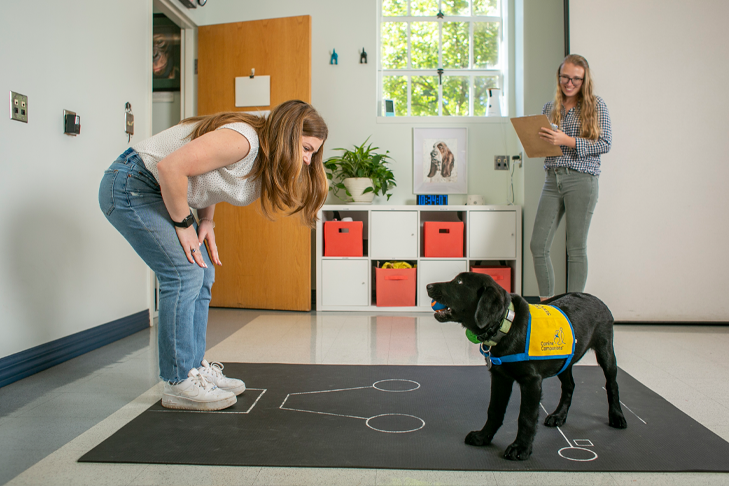
It wasn’t until the puppies reached 10 weeks of age that self-control began to emerge. They were between 12 and 14 weeks when they achieved adult-like abilities with self-control problems. One such problem involved putting a treat in a transparent tube with the open ends turned away from the puppy. Since the tube was see-through, the puppies’ eyes said the treat was right in front of them. But they had to resist the urge to go straight ahead and instead detour around the tube to one of the open ends.
Once they were between 12 and 14 weeks, the puppies could understand basic physics problems, such as understanding if two towels are lying on the floor, the one lying flat isn’t covering anything, whereas the towel with the bowl shape underneath is the one hiding the bowl. The puppies began making eye contact at this age. They also achieved adult levels of mastery in simple memory problems like remembering after 20 seconds which of two overturned bowls was hiding a treat.
But these are generalities. Not every puppy showed the exact same pattern of development. One puppy mastered all the problems before she was 13 weeks old, while some puppies struggled with tests designed for pigeons. Other puppies shone bright in one area, like communication, while they struggled with another, like physics.
How Does Puppy Brain Development Influence Training?
How does this new information impact how you train and interact with a puppy? Woods says it helps you modify your expectations of what your puppy can do at a given age with the reality of what they’re capable of. For example, the slow development of self-control makes puppy-proofing essential. “A 10-week-old puppy running around and tearing up the house is not intentionally misbehaving. They don’t have the self-control to inhibit one behavior over another. This is what training is. You’re asking a puppy or a dog to do something when they would prefer to do something else. Understanding that self-control comes online at a certain period helps you decide when to train your puppies to do various commands.”
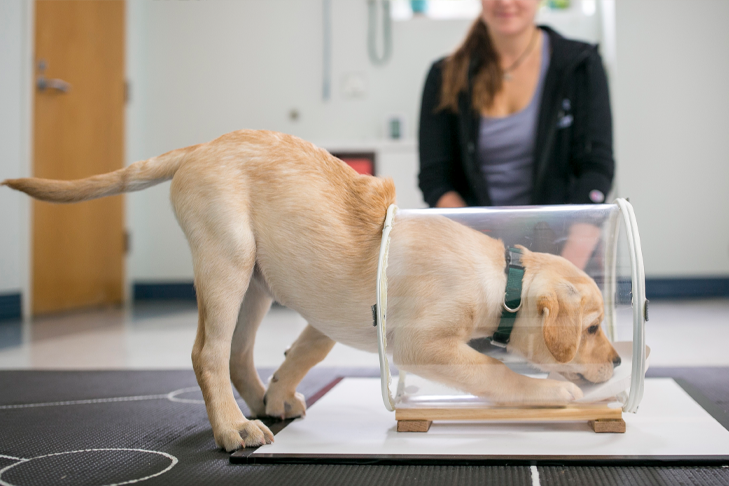
Also consider that puppies aren’t the strongest at understanding the physical world. They have a hard time with gravity or understanding that objects roll down or fall in a specific direction. They are also challenged by the concept of connectivity or being connected to you by a leash. Woods advises when it comes to physics, you have to do a lot of your puppy’s thinking for them.
Finally, the research showed that each puppy is an individual with their own timetable and set of skills. So, it’s important to realize that no matter how many puppies you’ve raised before, there will always be something surprising and unique about your next puppy. It’s not about success or failure with these skills, but about understanding the strategy your particular puppy uses to solve problems. That might make them suitable for search and rescue work, service work, or cuddling with the family on the couch. In Woods’ opinion, “Puppies are a lot like us in that they’re going to thrive in a job that is suited to their particular skill set, and it’s up to us to figure out what that skill set is.”
What Is Left to Discover About Puppy Brain Development?
For Woods, her favorite part of the Puppy Kindergarten research was seeing the puppies matched with somebody who needed them through Canine Companions, whether that was helping a child with autism, helping a young adult navigate their way through college, or assisting a person in a wheelchair. But what makes continuing this research so important is the fact that Woods and Dr. Hare still can’t predict which puppies will make great service dogs. “We’ve had puppies we never thought would make it just from their personalities and temperaments who went on to be great service dogs and puppies who we thought were surely going to make it who didn’t. So that’s why we need the science; without a rigorous form of testing, you’ll always be guessing.”
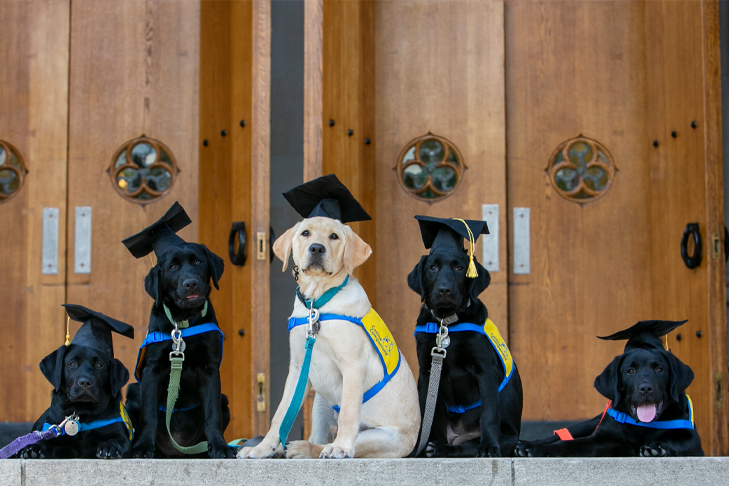
Woods says they have just barely scratched the surface when it comes to exploring the puppy mind. She looks forward to discovering even more types of intelligence in puppies because the abilities they tested in their research aren’t the only ones that exist. She also wants to expand their aptitude testing for potential service dogs. She believes because service dogs seamlessly blend into the lifestyles of their human partners, we have much to learn from them about how any puppy can become a great pet.
The post Duke University Studied 101 Puppies to See How Their Minds Developed appeared first on American Kennel Club.
Visit American Kennel Club at https://www.akc.org/expert-advice/puppy-information/how-do-puppies-minds-develop/

